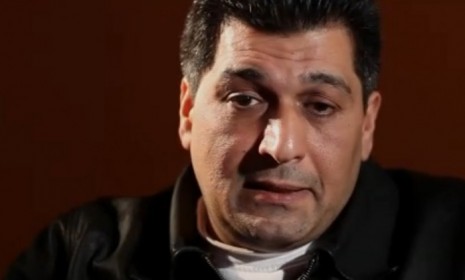Exposed: The lie that led us into Iraq
The Iraqi defector who claimed Saddam Hussein had weapons of mass destruction has finally confessed that he made the whole thing up. An instant guide

A free daily email with the biggest news stories of the day – and the best features from TheWeek.com
You are now subscribed
Your newsletter sign-up was successful
Eight years after then–Secretary of State Colin Powell used harrowing stories of Saddam Hussein's alleged biological and chemical weapons programs to make the Bush administration's case for invading Iraq, the man who supplied intel agents with those stories admits he made them up. Rafid Ahmed Alwan al-Janabi, known to U.S. and other Western spy agencies as "Curveball," tells The Guardian that he "fabricated" the whole WMD tale in the hopes of bringing Hussein down. He certainly helped, but what's his real story?
Who is "Curveball"?
Janabi was an Iraqi chemical engineer who now lives in Karlsruhe, Germany. He fled Iraq in 1995, and, beginning in 2000, worked for several years as a paid informant for Germany's secret service. He and his family were granted German citizenship in 2008. His now-admitted lies to German agents helped found the U.S. case for invading Iraq.
The Week
Escape your echo chamber. Get the facts behind the news, plus analysis from multiple perspectives.

Sign up for The Week's Free Newsletters
From our morning news briefing to a weekly Good News Newsletter, get the best of The Week delivered directly to your inbox.
From our morning news briefing to a weekly Good News Newsletter, get the best of The Week delivered directly to your inbox.
What did he lie about?
WMDs. Janabi claimed he helped build mobile germ-warfare labs at a facility hidden inside a birdseed purification plant just south of Baghdad. These mobile labs, he said, were driven from place to place to avoid detection. To bolster his story, Janabi also said that 12 bio-weapons technicians died in a 1998 accident. Colin Powell included all those fabrications in a pivotal speech to the United Nations in February, 2003.
Why did Janabi lie?
He now tells The Guardian that he wanted to "get rid" of Saddam. German agents, he says, "gave me this chance. I had the chance to fabricate something to topple the regime." The former CIA chief in Europe, Tyler Drumheller, says he thinks it's more likely Janabi just wanted to be rewarded with asylum in Germany. "If this was part of a grand scheme to overthrow Suddam Hussein then he is one of the world's greatest strategic planners," Drumheller says.
A free daily email with the biggest news stories of the day – and the best features from TheWeek.com
Did intel agencies really believe him?
Janabi says he thinks some in the intelligence world had uncovered his lies in mid-2000, but that the German agents who contacted him two years later still seemed to be taking his stories seriously. U.S. officials didn't have any direct contact with Janabi. Drumheller says he warned CIA headquarters before Powell's speech that Janabi might be a liar, and says CIA Deputy Director John McLaughlin replied, "Oh, I hope not, because this is really all we have."
What's the fallout?
"On the word of this third-rate, third-world con man, Bush caused tens of thousands of injuries and thousands of deaths among American forces, spent a trillion American dollars, and destroyed American credibility worldwide," says Christopher Manion at LewRockwell.com. On the other hand, says Tim Dickinson at Rolling Stone, Janabi is "a man who saw an opportunity to change history, and seized it."
Does Janabi regret his lies?
No. "I and my sons are proud... that we were the reason to give Iraq the margin of democracy," he insists. "Can you give me another solution? Believe me, there was no other way to bring about freedom to Iraq. There were no other possibilities."
Sources: Guardian (2,3,4), Death & Taxes, NPR (2), Rolling Stone, LewRockwell.com
-
 How the FCC’s ‘equal time’ rule works
How the FCC’s ‘equal time’ rule worksIn the Spotlight The law is at the heart of the Colbert-CBS conflict
-
 What is the endgame in the DHS shutdown?
What is the endgame in the DHS shutdown?Today’s Big Question Democrats want to rein in ICE’s immigration crackdown
-
 ‘Poor time management isn’t just an inconvenience’
‘Poor time management isn’t just an inconvenience’Instant Opinion Opinion, comment and editorials of the day